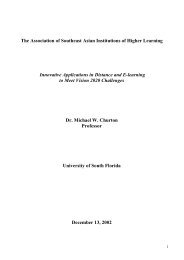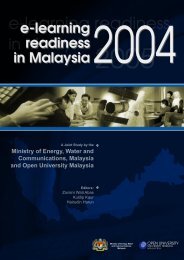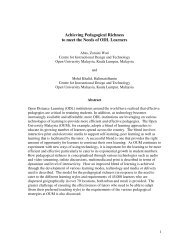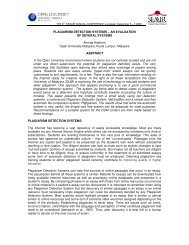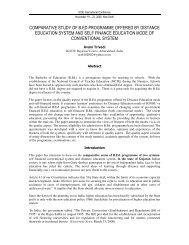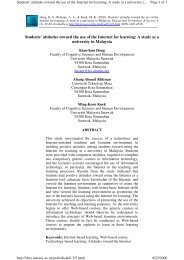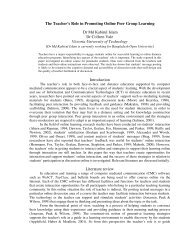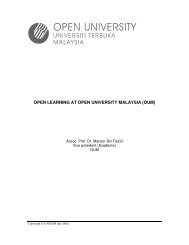lifelong learning and distance higher education - Asia Pacific Region
lifelong learning and distance higher education - Asia Pacific Region
lifelong learning and distance higher education - Asia Pacific Region
- No tags were found...
Create successful ePaper yourself
Turn your PDF publications into a flip-book with our unique Google optimized e-Paper software.
CHAPTER 5LIFELONG LEARNING IN THE AFRICANCONTEXT: A PRACTICAL EXAMPLE FROMSENEGALOlivier SagnaCHAPTER SUMMARYLifelong <strong>learning</strong> has been hard to put into practice in an African context on accountof the general problems affecting <strong>education</strong> <strong>and</strong> training <strong>and</strong> the obstacle of the digitaldivide. This article describes an initiative of the School for Librarians, Archivists <strong>and</strong>Documentation Specialists (Ecole des Bibliothécaires, Archivistes et Documentalistes)(EBAD) at Cheikh Anta Diop University in Dakar, Senegal. Through the experience ofsetting up a <strong>distance</strong> professional training scheme, EBAD has been able to show howthe use of information <strong>and</strong> communication technologies (ICTs), in close partnership withemployers, can widen access to training for employees, combine work with in-serviceor initial training, better harmonise training <strong>and</strong> work <strong>and</strong> make it easier to hire newlyqualified staff. At the same time, the effective development of <strong>lifelong</strong> <strong>learning</strong> dependson the introduction of a whole series of supportive measures.INTRODUCTIONThe importance of the concept of <strong>lifelong</strong> <strong>learning</strong> for the world of the twenty-firstcentury is forcefully stated in a memor<strong>and</strong>um published by the European Commission(Commission of the European Communities, 2000). The vision of <strong>education</strong> <strong>and</strong> trainingpresented therein features a combination of initial <strong>and</strong> in-service training, formal <strong>and</strong>non-formal <strong>education</strong>, self-directed <strong>learning</strong>, <strong>learning</strong> through practice <strong>and</strong> experience<strong>and</strong> wholly or partly ICT-based <strong>distance</strong> <strong>education</strong> designed to benefit learners not just atthe level of occupational skills, but also in regard to their own personal development.That is a hard concept to put into practice in an African context when most countrieshave yet to achieve the goal of <strong>education</strong> for all, <strong>and</strong> when few employees have access toin-service training either because they are ill-informed or on account of their employers’reluctance. It is made all the harder by the digital divide, which represents a significantobstacle now that ICTs form both the subject <strong>and</strong> the means of <strong>lifelong</strong> <strong>learning</strong>: thesubject, because ICT skills, for most people, are now basic requirements, <strong>and</strong> the means,51



